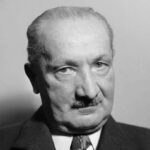Imagine a world where morality doesn’t depend on consequences, but on intent. A world where knowledge is not discovered, but actively constructed by the human mind. Welcome to the thought-world of Immanuel Kant, one of the most influential philosophers in history-and the intellectual engine behind much of modern ethics, political theory, psychology, and science.
Kant didn’t just contribute to philosophy. He redefined it. This article explores Kant’s groundbreaking ideas, his major works, and the ongoing influence of his thinking in everything from democracy and AI to global human rights.
Kant’s Context – The Enlightenment and the Age of Reason
Born in Königsberg in 1724, Kant lived during the Enlightenment, an era obsessed with reason, progress, and scientific clarity. But Kant was not content with inherited truths. In fact, his most important contribution was a radical critique of reason itself.
His famous motto – “Sapere aude! Dare to know!” – captures the Enlightenment spirit. But Kant gave it a twist: reason has limits, and knowing those limits is the key to true understanding.
The Critique of Pure Reason – Rethinking Knowledge
In Critique of Pure Reason, Kant asked: How do we know what we know? He argued that the mind doesn’t passively receive information from the world-it actively shapes it.
This was a philosophical revolution. According to Kant, space and time aren’t external things. They’re frameworks our minds impose on the world. Similarly, cause and effect are not observed – they are how our minds structure experience.
This insight, called transcendental idealism, challenged both empiricists (who believed all knowledge comes from the senses) and rationalists (who believed in innate ideas).
The Categorical Imperative – A New Kind of Ethics
Kant’s moral philosophy is just as bold. He rejected both utilitarianism and religious dogma as the basis of morality. Instead, he proposed the categorical imperative: a principle you could will to become a universal law.
This means: act only according to principles you would want everyone to follow. No exceptions. For Kant, morality is about duty, not results.
Key ideas:
- Humans must always be treated as ends, never as means.
- Moral law comes from reason, not emotion.
- Autonomy is the foundation of ethics.
Kant and Political Philosophy
Kant’s political vision was deeply influenced by his ethics. He believed in human dignity, autonomy, and rational governance. His essay Perpetual Peace laid the groundwork for liberal internationalism and inspired modern democratic principles.
Kant also envisioned a league of nations – an early model for the United Nations. His belief in universal rights still influences contemporary discussions of law, war, and global justice.
Kant’s Impact on Science and Epistemology
Though a philosopher, Kant directly influenced scientists like Einstein, who credited Kant’s ideas on space and time as foundational.
Kant’s model of the mind also laid groundwork for modern cognitive science. The idea that the brain actively organizes experience is central to theories of perception, AI, and even neuroscience.
Kant and Aesthetics – The Sublime and the Beautiful
In Critique of Judgment, Kant explored the nature of beauty and art. He introduced the concept of the sublime – the overwhelming experience of vastness or power – and argued that aesthetic judgment is universal, yet subjective.
This tension became central to Romanticism, influencing poets, painters, and composers. His ideas continue to guide debates in art theory and design.
Legacy and Influence
Kant’s fingerprints are everywhere. His thought influenced:
- Hegel and the dialectical method
- Schopenhauer, who adapted Kant’s metaphysics
- Nietzsche, who critiqued Kantian morality
- Contemporary ethics, especially debates on human dignity and universal rights
- Legal philosophy, including the basis for modern constitutional law
Criticisms and Controversies
Kant’s rigid moral system has been criticized for being too inflexible. What if telling the truth causes harm? His epistemology has also been challenged by later thinkers, including Hegel and the phenomenologists.
Additionally, Kant’s views on race and colonialism – often reflective of his time – have come under scrutiny. Modern scholarship continues to evaluate his legacy with nuance.
Immanuel Kant didn’t just reshape philosophy – he reshaped how we understand ourselves, our societies, and our obligations to one another. His insistence on reason, autonomy, and universal principles remains a cornerstone of ethical, political, and scientific thought.
Ready to dive deeper? Explore more German thinkers who reshaped modernity: Karl Marx, Friedrich Nietzsche, Georg Wilhelm Friedrich Hegel, and Arthur Schopenhauer.
Related articles:
Martin Heidegger
How German Philosophy Shaped the Modern World
Exploring the Depths of German Philosophy
Famous Germans: Icons Who Shaped the World








